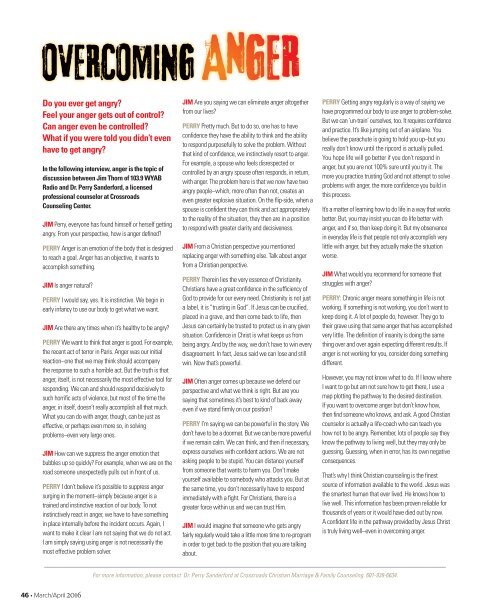Hometown Madison - March & April 2016
You also want an ePaper? Increase the reach of your titles
YUMPU automatically turns print PDFs into web optimized ePapers that Google loves.
Overcoming Anger<br />
Do you ever get angry?<br />
Feel your anger gets out of control?<br />
Can anger even be controlled?<br />
What if you were told you didn’t even<br />
have to get angry?<br />
In the following interview, anger is the topic of<br />
discussion between Jim Thorn of 103.9 WYAB<br />
Radio and Dr. Perry Sanderford, a licensed<br />
professional counselor at Crossroads<br />
Counseling Center.<br />
Jim Perry, everyone has found himself or herself getting<br />
angry. From your perspective, how is anger defined?<br />
Perry Anger is an emotion of the body that is designed<br />
to reach a goal. Anger has an objective, it wants to<br />
accomplish something.<br />
Jim Is anger natural?<br />
Perry I would say, yes. It is instinctive. We begin in<br />
early infancy to use our body to get what we want.<br />
Jim Are there any times when it’s healthy to be angry?<br />
Perry We want to think that anger is good. For example,<br />
the recent act of terror in Paris. Anger was our initial<br />
reaction–one that we may think should accompany<br />
the response to such a horrible act. But the truth is that<br />
anger, itself, is not necessarily the most effective tool for<br />
responding. We can and should respond decisively to<br />
such horrific acts of violence, but most of the time the<br />
anger, in itself, doesn’t really accomplish all that much.<br />
What you can do with anger, though, can be just as<br />
effective, or perhaps even more so, in solving<br />
problems–even very large ones.<br />
Jim How can we suppress the anger emotion that<br />
bubbles up so quickly? For example, when we are on the<br />
road someone unexpectedly pulls out in front of us.<br />
Perry I don’t believe it’s possible to suppress anger<br />
surging in the moment–simply because anger is a<br />
trained and instinctive reaction of our body. To not<br />
instinctively react in anger, we have to have something<br />
in place internally before the incident occurs. Again, I<br />
want to make it clear I am not saying that we do not act.<br />
I am simply saying using anger is not necessarily the<br />
most effective problem solver.<br />
46 • <strong>March</strong>/<strong>April</strong> <strong>2016</strong><br />
Jim Are you saying we can eliminate anger altogether<br />
from our lives?<br />
Perry Pretty much. But to do so, one has to have<br />
confidence they have the ability to think and the ability<br />
to respond purposefully to solve the problem. Without<br />
that kind of confidence, we instinctively resort to anger.<br />
For example, a spouse who feels disrespected or<br />
controlled by an angry spouse often responds, in return,<br />
with anger. The problem here is that we now have two<br />
angry people–which, more often than not, creates an<br />
even greater explosive situation. On the flip-side, when a<br />
spouse is confident they can think and act appropriately<br />
to the reality of the situation, they then are in a position<br />
to respond with greater clarity and decisiveness.<br />
Jim From a Christian perspective you mentioned<br />
replacing anger with something else. Talk about anger<br />
from a Christian perspective.<br />
Perry Therein lies the very essence of Christianity.<br />
Christians have a great confidence in the sufficiency of<br />
God to provide for our every need. Christianity is not just<br />
a label, it is “trusting in God”. If Jesus can be crucified,<br />
placed in a grave, and then come back to life, then<br />
Jesus can certainly be trusted to protect us in any given<br />
situation. Confidence in Christ is what keeps us from<br />
being angry. And by the way, we don’t have to win every<br />
disagreement. In fact, Jesus said we can lose and still<br />
win. Now that’s powerful.<br />
Jim Often anger comes up because we defend our<br />
perspective and what we think is right. But are you<br />
saying that sometimes it’s best to kind of back away<br />
even if we stand firmly on our position?<br />
Perry I’m saying we can be powerful in the story. We<br />
don’t have to be a doormat. But we can be more powerful<br />
if we remain calm. We can think, and then if necessary,<br />
express ourselves with confident actions. We are not<br />
asking people to be stupid. You can distance yourself<br />
from someone that wants to harm you. Don’t make<br />
yourself available to somebody who attacks you. But at<br />
the same time, you don’t necessarily have to respond<br />
immediately with a fight. For Christians, there is a<br />
greater force within us and we can trust Him.<br />
Jim I would imagine that someone who gets angry<br />
fairly regularly would take a little more time to re-program<br />
in order to get back to the position that you are talking<br />
about.<br />
Perry Getting angry regularly is a way of saying we<br />
have programmed our body to use anger to problem-solve.<br />
But we can ‘un-train’ ourselves, too. It requires confidence<br />
and practice. It’s like jumping out of an airplane. You<br />
believe the parachute is going to hold you up–but you<br />
really don’t know until the ripcord is actually pulled.<br />
You hope life will go better if you don’t respond in<br />
anger, but you are not 100% sure until you try it. The<br />
more you practice trusting God and not attempt to solve<br />
problems with anger, the more confidence you build in<br />
this process.<br />
It’s a matter of learning how to do life in a way that works<br />
better. But, you may insist you can do life better with<br />
anger, and if so, then keep doing it. But my observance<br />
in everyday life is that people not only accomplish very<br />
little with anger, but they actually make the situation<br />
worse.<br />
Jim What would you recommend for someone that<br />
struggles with anger?<br />
Perry: Chronic anger means something in life is not<br />
working. If something is not working, you don’t want to<br />
keep doing it. A lot of people do, however. They go to<br />
their grave using that same anger that has accomplished<br />
very little. The definition of insanity is doing the same<br />
thing over and over again expecting different results. If<br />
anger is not working for you, consider doing something<br />
different.<br />
However, you may not know what to do. If I know where<br />
I want to go but am not sure how to get there, I use a<br />
map plotting the pathway to the desired destination.<br />
If you want to overcome anger but don’t know how,<br />
then find someone who knows, and ask. A good Christian<br />
counselor is actually a life-coach who can teach you<br />
how not to be angry. Remember, lots of people say they<br />
know the pathway to living well, but they may only be<br />
guessing. Guessing, when in error, has its own negative<br />
consequences.<br />
That’s why I think Christian counseling is the finest<br />
source of information available to the world. Jesus was<br />
the smartest human that ever lived. He knows how to<br />
live well. This information has been proven reliable for<br />
thousands of years or it would have died out by now.<br />
A confident life in the pathway provided by Jesus Christ<br />
is truly living well–even in overcoming anger.<br />
___________________________________________________________________________________________________________________________________________<br />
For more information, please contact Dr. Perry Sanderford at Crossroads Christian Marriage & Family Counseling. 601-939-6634.

















